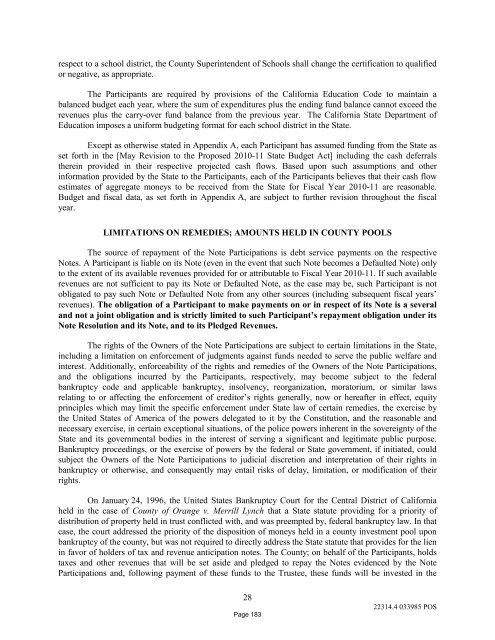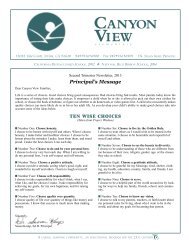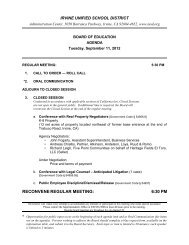reconvene regular meeting: 7:00 pm - Irvine Unified School District
reconvene regular meeting: 7:00 pm - Irvine Unified School District
reconvene regular meeting: 7:00 pm - Irvine Unified School District
Create successful ePaper yourself
Turn your PDF publications into a flip-book with our unique Google optimized e-Paper software.
espect to a school district, the County Superintendent of <strong>School</strong>s shall change the certification to qualified<br />
or negative, as appropriate.<br />
The Participants are required by provisions of the California Education Code to maintain a<br />
balanced budget each year, where the sum of expenditures plus the ending fund balance cannot exceed the<br />
revenues plus the carry-over fund balance from the previous year. The California State Department of<br />
Education imposes a uniform budgeting format for each school district in the State.<br />
Except as otherwise stated in Appendix A, each Participant has assumed funding from the State as<br />
set forth in the [May Revision to the Proposed 2010-11 State Budget Act] including the cash deferrals<br />
therein provided in their respective projected cash flows. Based upon such assumptions and other<br />
information provided by the State to the Participants, each of the Participants believes that their cash flow<br />
estimates of aggregate moneys to be received from the State for Fiscal Year 2010-11 are reasonable.<br />
Budget and fiscal data, as set forth in Appendix A, are subject to further revision throughout the fiscal<br />
year.<br />
LIMITATIONS ON REMEDIES; AMOUNTS HELD IN COUNTY POOLS<br />
The source of repayment of the Note Participations is debt service payments on the respective<br />
Notes. A Participant is liable on its Note (even in the event that such Note becomes a Defaulted Note) only<br />
to the extent of its available revenues provided for or attributable to Fiscal Year 2010-11. If such available<br />
revenues are not sufficient to pay its Note or Defaulted Note, as the case may be, such Participant is not<br />
obligated to pay such Note or Defaulted Note from any other sources (including subsequent fiscal years’<br />
revenues). The obligation of a Participant to make payments on or in respect of its Note is a several<br />
and not a joint obligation and is strictly limited to such Participant’s repayment obligation under its<br />
Note Resolution and its Note, and to its Pledged Revenues.<br />
The rights of the Owners of the Note Participations are subject to certain limitations in the State,<br />
including a limitation on enforcement of judgments against funds needed to serve the public welfare and<br />
interest. Additionally, enforceability of the rights and remedies of the Owners of the Note Participations,<br />
and the obligations incurred by the Participants, respectively, may become subject to the federal<br />
bankruptcy code and applicable bankruptcy, insolvency, reorganization, moratorium, or similar laws<br />
relating to or affecting the enforcement of creditor’s rights generally, now or hereafter in effect, equity<br />
principles which may limit the specific enforcement under State law of certain remedies, the exercise by<br />
the United States of America of the powers delegated to it by the Constitution, and the reasonable and<br />
necessary exercise, in certain exceptional situations, of the police powers inherent in the sovereignty of the<br />
State and its governmental bodies in the interest of serving a significant and legitimate public purpose.<br />
Bankruptcy proceedings, or the exercise of powers by the federal or State government, if initiated, could<br />
subject the Owners of the Note Participations to judicial discretion and interpretation of their rights in<br />
bankruptcy or otherwise, and consequently may entail risks of delay, limitation, or modification of their<br />
rights.<br />
On January 24, 1996, the United States Bankruptcy Court for the Central <strong>District</strong> of California<br />
held in the case of County of Orange v. Merrill Lynch that a State statute providing for a priority of<br />
distribution of property held in trust conflicted with, and was preempted by, federal bankruptcy law. In that<br />
case, the court addressed the priority of the disposition of moneys held in a county investment pool upon<br />
bankruptcy of the county, but was not required to directly address the State statute that provides for the lien<br />
in favor of holders of tax and revenue anticipation notes. The County; on behalf of the Participants, holds<br />
taxes and other revenues that will be set aside and pledged to repay the Notes evidenced by the Note<br />
Participations and, following payment of these funds to the Trustee, these funds will be invested in the<br />
28<br />
Page 183<br />
22314.4 033985 POS
















